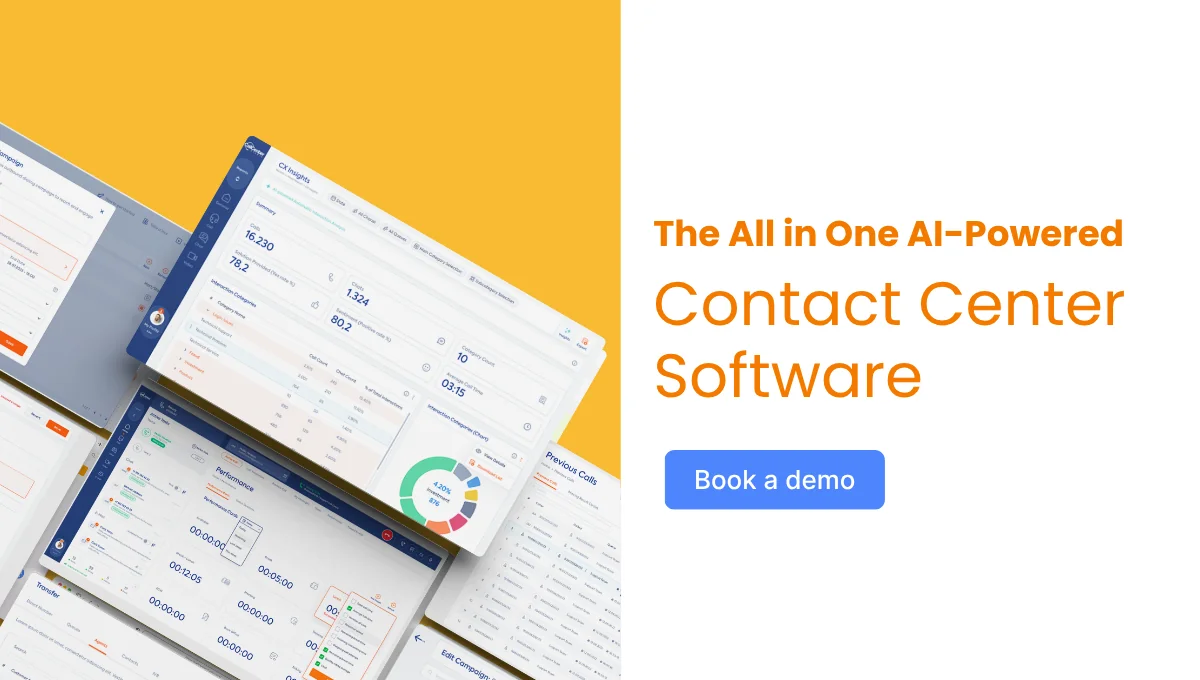Let’s think of your call center migration as time travel. You go live like stepping into a time machine. You expect a sleek new contact center platform and a well-oiled team, but instead, you land three months behind with untrained staff and tangled systems.
Why?
Because you didn’t ask the right onboarding questions. This phase is where even solid vendor relationships can fall apart.
If you’re sizing up vendors for your next contact center implementation, these 5 critical onboarding questions are for your vendor.
How long will the onboarding process take, and what’s included?
Don’t just ask your vendor when you can go live, ask:
- What are the milestones?
- Who owns what?
- And what happens if something delays the process?
Vendors love to throw out vague timelines like “4 to 6 weeks,” but it’s meaningless unless that includes:
- Detailed deliverables (like config setup and admin console prep),
- Role-specific training sessions with timelines, and
- Integration support across CRM, helpdesk, or WFM tools,
If a vendor can’t give you a clear, phase-by-phase onboarding roadmap, you’re already behind schedule. So insist on a detailed onboarding checklist outlining what gets done when and by whom.
What training and resources will my team receive?
Let’s say you arrive in the future and your sleek platform is live… but your team is staring blankly at it.
Without proper training, even the best platforms collect dust. Training is the fuel that powers adoption. Ask your vendor if they offer:
- Live training tailored to different team roles,
- Self-paced courses with tracking and progress reports,
- Certifications to validate skill levels, or
- Help centers with searchable FAQs, interactive guides, and real-time chat support.
A strong SaaS onboarding process prioritizes hands-on and role-specific training, not just a knowledge base link.
Will I have a dedicated onboarding specialist or support team?
If you made time travel, would you hop in a time machine without a trained operator? Of course not. The same logic applies here. A dedicated onboarding specialist makes sure nothing slips through the cracks.
You want to know if you’ll have a consistent point of contact, someone who knows:
- Your business goals,
- Use case, and
- Timeline.
Better yet, ask how often you’ll meet and what their support SLA looks like.
How do you handle data migration and system integrations?
Handling the data migration is like wiring under the floorboards. If it shorts, the whole house goes dark. If you’re moving to a cloud platform, this step is non-negotiable.
So ask your vendor:
- How they plan to migrate your historical call data, recordings, contacts, and configurations.
- What systems do they natively integrate with?
- Do they have past experience migrating from your current system?
Furthermore, look for specific tools, timelines, and testing procedures. For example:
- Tools: ETL (Extract, Transform, Load) platforms like Talend or Fivetran, custom-built migration scripts, and middleware integration.
- Timelines: Clear, written schedules outlining backup windows, migration phases, and temporary system states like read-only access.
- Testing procedures: Steps like sandbox testing, data integrity validation, parallel run comparisons, and rollback plans to ensure everything functions correctly before full deployment.
Messy data migration causes delays, compliance risks, and confused agents. Don’t leave it to chance.
What’s your post-onboarding success plan?
You made it to your go-live date. Pop the champagne. Now what?
A good vendor doesn’t disappear after onboarding. They help you scale, measure success, and optimize.
Ask them if you get quarterly:
- business reviews,
- performance benchmarks,
- usage analytics, or
- access to a customer success manager.
If the answer is “We’ll be here if you need us,” sorry, but that’s not a plan, that’s a hope. Great vendors see onboarding as just the beginning, not the end of your relationship.
If you’re looking for proof that a well-managed onboarding can make all the difference, look no further than Call Center Studio’s
In just six weeks, we completed a full cloud migration and Salesforce integration of our e-Commerce partner without losing a single byte of data.
The result:
- 330% operations growth
The operations size grew from 70 to 305 contact center agents - 200% ROI increase
Business operations doubled their revenue - 1.5 mins talk time saved
Agents spend less time on the phone during peak periods – freeing up valuable time.
Check out the full case study here.
Curious how your onboarding can look like that? Book your personal demo.
Your future self will thank you
Choosing a call center software vendor is about the journey.
If you’re a fast-moving team, skipping onboarding questions is like skipping the pre-flight checklist. Use these five vendor onboarding questions as your time machine calibration settings.
Before you sign anything, make sure the vendor can:
- Provide a clear timeline with documented milestones
- Deliver tailored training across all roles
- Assign a dedicated onboarding lead
- Ensure smooth data migration and integrations
- Support long-term goals with a structured success plan
Next time you’re evaluating platforms, ask yourself: Will this vendor get me to my future or trap me in a never-ending deployment loop?
FAQ
What is contact center onboarding, and why does it matter?
Contact center onboarding is the process of setting up and deploying a new call center software solution. It includes training, data migration, and systems integration. A smooth onboarding ensures faster adoption, better ROI, and reduced downtime.
How long does the average onboarding process take?
Typical timelines range from 3 to 8 weeks, depending on company size and integration complexity. Always get a timeline in writing.







